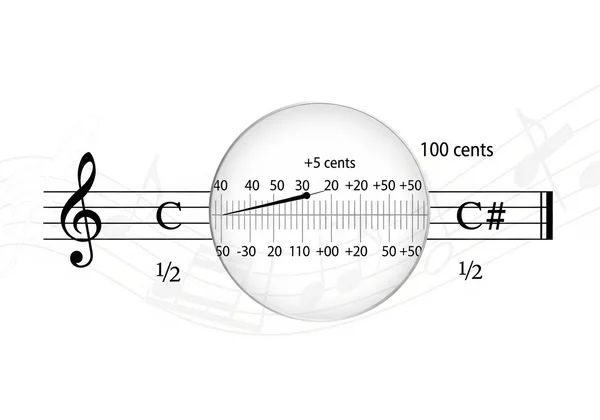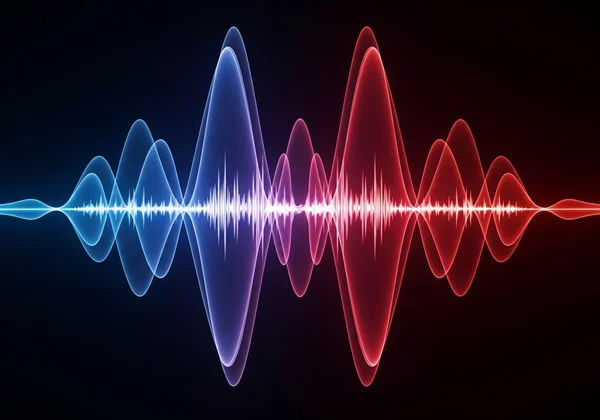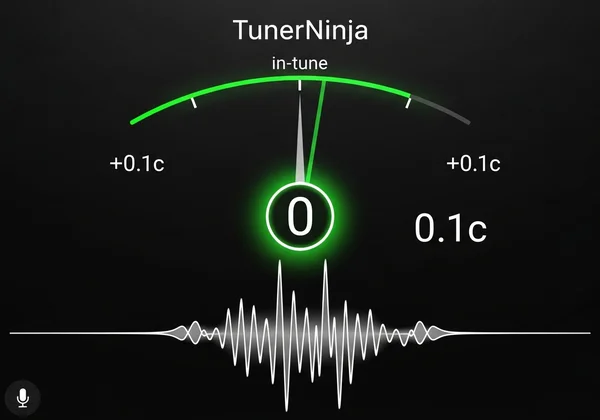Tuner Ninja Accuracy: Master Cents in Music with the Best Free Online Tuner
Ever spent time tuning your instrument, only to find that some notes still sound slightly "off" when you play a chord? You're alone. The secret to achieving truly perfect pitch lies in understanding a tiny unit of measurement that makes a world of difference: the musical cent. Many musicians wonder, what is the best free instrument tuner that can handle this level of detail?
This guide will demystify the concept of cents in music tuning, explaining why precision is non-negotiable for a clean, professional sound. We’ll explore how even the smallest inaccuracies can affect your music and reveal how the advanced technology behind a great online guitar tuner from tuner ninja can help you achieve sonic perfection every time, whether you're a beginner or a seasoned pro.
What Exactly Are Cents in Tuning?
Before we can appreciate the importance of accuracy, we need to understand what we're measuring. In music, a "cent" is a logarithmic unit of measure used for musical intervals. While that sounds complex, the concept is quite simple. Think of it as the inches on a ruler for sound, allowing musicians to talk about and measure pitch with incredible precision.
The Basics of Musical Pitch and Frequency Explained
Every sound you hear, from a strummed guitar string to a sung note, is a vibration. The speed of that vibration is called its frequency, measured in Hertz (Hz). A higher frequency results in a higher pitch, while a lower frequency produces a lower pitch. For example, the standard tuning for the A string on a guitar (A4) is 440 Hz.
These frequencies correspond to the notes we know, like A, B, C, and so on. The distance between two notes, such as from C to C-sharp, is called a semitone or a half-step. This is the smallest interval in Western music, but for a truly refined sound, we need to zoom in even further.
Dividing the Semitone: Why 100 Cents Matter for Musicians
This is where cents come in. A semitone is divided into 100 cents. So, one cent is simply 1/100th of a semitone. This micro-measurement allows us to describe the tiny deviations from a perfect note. If a tuner shows your note is "+5 cents," it means your note is 5/100ths of a semitone too sharp. If it shows "-10 cents," it's 10/100ths too flat.
Why does this matter? While a casual listener might not notice a 2-cent difference, the human ear is surprisingly sensitive. When multiple notes are played together in a chord, these tiny inaccuracies compound, leading to a sound that feels dissonant, muddy, or just unpleasing. For any musician, mastering cents is the first step toward a polished sound. A quality instrument tuner is your best tool for this.

Why Tuner Accuracy Is Essential for Perfect Pitch
Now that we know what cents are, it becomes clear why the tuner accuracy provided by a tool like the tuner ninja is so critical. A tuner that is only accurate to ±5 cents can leave your instrument sounding subtly out of tune, even when the display shows a green light. This can be a source of immense frustration, especially for beginners who trust their tools completely.
The Impact of Micro-Deviations on Your Instrument's Sound
Even small deviations of a few cents can have a noticeable impact. A guitar with one string 4 cents sharp and another 3 cents flat will produce chords that lack clarity and resonance. The notes will clash in a subtle way, creating an unpleasant "beating" effect as the sound waves interfere with each other.
For solo instruments like the violin or bass, intonation is everything. A note that is just slightly off can make a beautiful melody sound amateurish. In a recording studio or when playing with other musicians, this precision is even more critical. If your instrument is tuned to a different standard of accuracy than others, the entire performance can sound disjointed. Using an accurate bass tuner online ensures you lock in perfectly with the rest of the band.

From Practice to Performance: The Need for Precision Tuning
The need for precision isn't just for professionals. For beginners like Leo, a student learning on his first guitar, an accurate tuner builds a solid foundation. Practicing with a perfectly tuned instrument helps develop a good ear and establishes a correct sense of pitch from day one. It makes the learning process more rewarding because the instrument sounds the way it's supposed to.
For hobbyists like Maria, who plays the ukulele to unwind, a beautiful-sounding instrument enhances the entire experience. Precision tuning ensures every strummed chord is rich and harmonious. When you're ready to share your music with others, whether on stage or on social media, you can perform with the confidence that your instrument is perfectly in tune.
Achieving Unmatched Precision with TunerNinja's Advanced Technology
This is where the right tool makes all the difference. While many tuners exist, not all are created equal. As a tech expert, I'm impressed by platforms that leverage sophisticated algorithms to deliver professional-grade results. For unparalleled precision, the tuner ninja platform is a prime example of this, offering a web-based tuner that rivals the precision of high-end hardware.
TunerNinja's ±0.1 Cent Accuracy: How We Do It
The key competitive advantage of TunerNinja is its incredible precision of ±0.1 cents. This level of tuner accuracy is more than sufficient for even the most demanding professional applications, including studio recording and orchestral performance. It is achieved through an advanced pitch detection algorithm that analyzes the sound from your device's microphone in real-time.
This algorithm can distinguish between the fundamental frequency of the note and its overtones, isolating the core pitch with surgical precision. It processes this data instantly, providing immediate feedback that is ten times more accurate than many standard digital tuners. By using a microphone tuner with this technology, you are ensuring your instrument is not just "close enough," but perfectly on pitch.
Beyond Just Pitch: Real-Time Visual Feedback for Intuitive Tuning
Exceptional accuracy is only useful if it's easy to understand. TunerNinja excels here by pairing its powerful engine with a highly intuitive interface. The main dashboard provides a clear needle that shows you exactly how sharp or flat your note is, while a real-time waveform visualizer lets you "see" your sound.
This multi-faceted approach to visual feedback helps musicians of all levels. A beginner can simply focus on getting the needle into the green zone. A more advanced player can use the waveform and cent display to make micro-adjustments, developing a deeper understanding of their instrument's intonation. This turns the tedious chore of tuning into an engaging and educational experience.

Master Your Sound: Tune with Ninja Precision and Confidence
Understanding cents is the key to unlocking a more professional and pleasing musical sound. It’s the secret ingredient that separates a good performance from a great one. While the concept might seem technical, the solution is simple: use a tool built for precision.
An inaccurate tuner can hold you back, but a hyper-accurate tool like the tuner ninja can elevate your music. TunerNinja offers world-class ±0.1 cent accuracy for free, in your browser, on any device. Stop settling for "close enough" and start tuning with the confidence that comes from ninja-like precision. Visit TunerNinja now to experience the difference for yourself.
Your Questions About Cents and Tuner Accuracy Answered
How accurate do I really need my instrument tuner to be?
For casual solo practice, a tuner with ±1 to ±3 cents of accuracy is often sufficient. However, for recording, playing with other musicians, or simply achieving the best possible sound, an accuracy of ±1 cent or better is highly recommended. Using a tool with ±0.1 cent accuracy like the free tuner on TunerNinja ensures you're always covered for any musical situation.
Is an online tuner as accurate as a hardware tuner?
Yes, and in many cases, more so. The accuracy of a tuner depends on its pitch detection algorithm, not its physical form. A sophisticated, browser-based tool like the tuner ninja can outperform many cheap clip-on or pedal tuners. It offers the precision of a professional hardware strobe tuner without the cost or inconvenience.
What's the difference between cents and hertz in music?
Hertz (Hz) is an absolute unit that measures the frequency (vibrations per second) of a sound wave. Cents are a relative unit that measures the interval, or distance, between two pitches. While a note's target is a specific frequency in Hz (e.g., A4 = 440 Hz), cents tell you how far off you are from that target in musical terms.
Can I train my ear to hear small cent differences?
Absolutely. This is a skill known as ear training. Regularly using a highly accurate tuner is one of the best ways to develop it. By seeing the precise cent deviation on the screen while hearing the sound, you begin to associate the subtle dissonance with the visual feedback. Over time, you'll be able to identify slightly out-of-tune notes by ear alone.